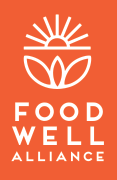Eugene Cooke & Nicole Bluh | Grow Where You Are
/Eugene Cooke & Nicole Bluh
Grow Where You Are
Fairburn, Fulton County
Business partners and seasoned growers Eugene Cooke and Nicole Bluh both have a deep passion for growing food and ensuring that women and BIPOC growers have a space in Atlanta’s local movement. In 2014 Eugene established the Grow Where You Are Collective as a social enterprise to inspire local food entrepreneurship. Despite encouragement to start a nonprofit, Eugene emphasized the importance of owning a business. “As a father, the model needed to be that I could pass on a business to my kids,” said Eugene. He noticed that while BIPOC and women growers were often pushed toward nonprofit work, their white male counterparts were celebrated for their entrepreneurial acumen. The GWYA collective began collaborating on multiple projects that would bring fresh, local food to their community and secure financial stability for their families.
“It's never futile to try to grow where you are,” said Nicole describing why the business name holds so much meaning.
Recently, they got connected with a landowner in South Fulton who wanted to put her property to good use. What started out as just a consultation project turned into a new partnership opportunity where the two would cultivate the land themselves. “It happened at a very interesting time, because we were previously farming in Covington,” said Nicole. The new location saved them time traveling from the farm to the markets, but there was one challenge: they didn’t have the funds to get the land fully operational.
Already familiar with Food Well Alliance, they applied for a grant and received $25,000 to help build a well house to protect the pipes from freezing in the winter, a wash station, and fencing to keep the deer away. They’re also working on a mobile cooler to make it easier to transport produce to the markets. You can find them at the Freedom Parkway Farmers Market on Saturdays.
But it’s not just about the materials and supplies – the support contributed to a bigger picture. “If one of our customers comes to the market and they meet another customer because Food Well has invested to make sure that we can have fencing to actually grow some food, that relationship might turn into something else that's beneficial. It doesn't just stop with us being able to make a living and sell food.”
Fundamental resources like a fence to protect our crops can ripple into community building when our customers are able to connect at the market table.
“Investing in farmers is a gamble,” said Nicole explaining how challenging this work can be. “The impact it can make when you actually invest in somebody, I think that’s powerful.”
For Eugene and Nicole, donor support helps nourish communities. “In America we have a nutrition deficiency,” said Eugene. “When donors give, they’re contributing to increased nutrition [...]. What’s in the stores doesn’t compare to somebody harvesting basil for you and you preparing it the same day. So what they’re doing is immeasurable.”








